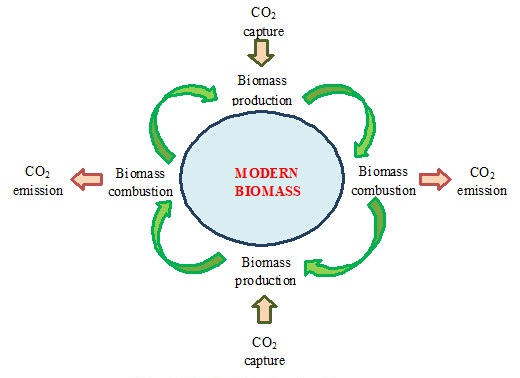Promote the use of locally available biomass and bioenergy sources in Pakistan. Foster research and development in the field of biomass and bioenergy. Facilitate knowledge-sharing and collaboration between researchers, industry, and government. Promote entrepreneurship and small businesses in the agriculture and energy sectors. Increase access to energy in remote areas and promote rural development. Mitigate climate change by reducing greenhouse gas emissions and promoting sustainable development. Reduce dependence on imported fossil fuels and improve energy security in Pakistan.

Biomass Energy
The energy stored in biomass can be released to produce renewable electricity
or heat. Biopower can be generated through combustion or gasification of dry.

Biofuels
A number of transportation fuels can be produced from biomass, helping to alleviate demand for petroleum products and improve the greenhouse gas emissions profile of the transportation.

Biobased Products
Just as biomass can substitute for fossil fuels in the production of energy, it can also provide a renewable substitute for the many industrial products and materials.

Biomass Feedstocks
Every region has its own locally generated biomass feedstocks from agriculture, forest, and urban sources.
A wide variety of biomass feedstocks are available and biomass can be produced.
Aims
Visions
To make biomass and bioenergy a mainstream source of energy in Pakistan. To contribute to the development of a sustainable, inclusive, and low-carbon economy in the country. To reduce the negative impacts of energy use on public health and the environment in Pakistan. To promote the use of decentralized energy solutions to increase access to energy in remote areas of the country. To foster innovation and technology development in the field of biomass and bioenergy in Pakistan.
Objectives
Why it is important?
Why the Pakistan Society of Biomass and Bioenergy is important:
- Promote sustainable development: The use of biomass and bioenergy as alternative sources of energy can contribute significantly to sustainable development. The society can promote the adoption of these technologies and encourage research in this field.
- Address energy security issues: Pakistan has a growing demand for energy, and it is heavily dependent on imported fossil fuels. The society can play a vital role in promoting the use of locally available biomass and bioenergy sources, reducing the dependence on imports and ensuring energy security.
- Create awareness: There is a lack of awareness among the general public about the benefits of biomass and bioenergy. The society can educate the public about the potential of these technologies to provide energy, reduce greenhouse gas emissions and contribute to sustainable development.
- Provide a platform for collaboration: The society can provide a platform for researchers, scientists, and stakeholders to collaborate and exchange ideas, promote research and development, and build partnerships to promote biomass and bioenergy.
- Encourage policy development: The society can advocate for the development of policies that promote the use of biomass and bioenergy, such as incentives, subsidies, and regulations that encourage investment in these technologies.
- Build capacity: The society can promote training and capacity building programs to develop human resources in the field of biomass and bioenergy, promoting the development of a skilled workforce.
- Foster innovation: The society can promote research and development in the field of biomass and bioenergy, encouraging innovation in the development of new technologies and processes.
How it is useful for Pakistan
How the Pakistan Society of Biomass and Bioenergy is useful for Pakistan:
- Diversify energy sources: The society can promote the use of locally available biomass and bioenergy sources, reducing Pakistan’s reliance on imported fossil fuels, diversifying the country’s energy sources, and improving energy security.
- Mitigate climate change: The use of biomass and bioenergy can significantly reduce greenhouse gas emissions, contributing to the global effort to mitigate climate change. The society can promote the adoption of these technologies, reducing Pakistan’s carbon footprint.
- Promote economic development: The use of biomass and bioenergy can provide opportunities for rural development, promote entrepreneurship and small businesses, and create jobs in the agriculture and energy sectors. Society can promote these opportunities and help to realize the potential benefits of biomass and bioenergy for Pakistan’s economy.
- Increase access to energy: Many areas of Pakistan lack access to electricity and modern energy services. Society can promote the use of decentralized biomass and bioenergy systems, increasing access to energy in remote areas and improving the quality of life of the population.
- Reduce air pollution: The use of biomass and bioenergy can reduce indoor and outdoor air pollution, improving public health and reducing healthcare costs. The society can promote these technologies and help to reduce the health impacts of air pollution in Pakistan.
- Foster innovation and research: The society can promote research and development in the field of biomass and bioenergy, fostering innovation and promoting the development of new technologies and processes.
- Develop partnerships: The society can facilitate partnerships between researchers, industry, and government, promoting collaboration and knowledge-sharing to accelerate the adoption of biomass and bioenergy technologies in Pakistan.
How it will be important for the progress of the country by providing energy from local sources?
the Pakistan Society of Biomass and Bioenergy is important for the progress of the country by providing energy from local sources:
- Reduce dependence on imports: The use of locally available biomass and bioenergy sources can reduce Pakistan’s dependence on imported fossil fuels. This can save foreign exchange, reduce the trade deficit, and contribute to the country’s economic growth.
- Promote rural development: Biomass and bioenergy technologies can provide opportunities for rural development, promoting entrepreneurship and small businesses, and creating jobs in the agriculture and energy sectors. This can help to reduce poverty, improve the standard of living, and promote inclusive growth in Pakistan.
- Improve energy security: The use of local biomass and bioenergy sources can improve Pakistan’s energy security, reducing the country’s vulnerability to global energy price fluctuations, supply disruptions, and geopolitical risks.
- Mitigate climate change: The use of biomass and bioenergy can reduce greenhouse gas emissions, contributing to the global effort to mitigate climate change. This can help to reduce the risk of climate-related disasters, protect the environment, and promote sustainable development in Pakistan.
- Increase access to energy: Many areas of Pakistan lack access to electricity and modern energy services. Biomass and bioenergy technologies can provide decentralized energy solutions, increasing access to energy in remote areas and improving the quality of life of the population.
- Foster innovation and research: The society can promote research and development in the field of biomass and bioenergy, fostering innovation and promoting the development of new technologies and processes that are suitable for Pakistan’s unique conditions.
- Build capacity: The society can promote training and capacity building programs to develop human resources in the field of biomass and bioenergy, promoting the development of a skilled workforce that can contribute to the country’s energy and economic development.
President



